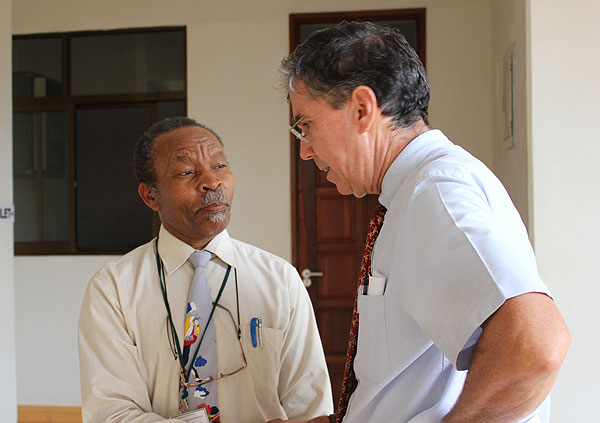
RDU isn't the only airport where you're likely to bump into a member of the Duke faculty. Researchers in global health, the environment, engineering and other fields regularly visit international colleagues to produce discoveries and insights that help not only the people in these countries, but also folks back home in the United States.
Much of Duke's work takes place in developing and newly industrialized countries, across a wide range of subjects. Geneticist Michael Hauser has been working in India, biomedical engineer Nimmi Ramanujam is active in Haiti and infectious disease specialist John Bartlett has spent years in Tanzania, to name just a few.
Sociologist Gary Gereffi seeks to help reverse the decline of U.S. manufacturing. As director of Duke's Center on Globalization, Governance & Competitiveness, he studies how global "value chains" affect North Carolina and other states. "Virtually every product that appears on a Walmart shelf is now made overseas," he says. "For the United States to regain its edge in manufacturing, especially advanced manufacturing involving high-tech and high-quality products, we need to learn how to take advantage of unique U.S. strengths in the global economy."
Gereffi, who is scheduled to return to Durham today from his latest trip to Qatar and Jordan, says such research in developing areas "matters to the average American."
Xavier Basurto, a Nicholas School of the Environment assistant professor who has worked extensively in Mexico and Costa Rica, says the same of his research on how different kinds of communities manage natural resources. "Understanding other settings and contexts and comparing them to the U.S. allows us to better tease out what works and what does not work about environmental regulations in the U.S.," he says. Both the United States and Mexico seek to protect local fisheries but have come up with "very different regulatory solutions," he notes.
Michael Hauser, a Duke professor of medicine and ophthalmology, collaborates with an eye institute in Hyderabad, India, to study a childhood form of glaucoma. "There are so many people in India that even patients with rare diseases can be found in sufficient numbers to conduct good scientific research," he says. Hauser's team in Durham identified about 75 patients with primary congenital glaucoma; in the same amount of time, his Hyderabad colleagues identified more than 600.
Cardiologist Svati Shah of the newly formed Duke Molecular Physiology Institute has been collecting blood samples from patients in India, which her team will analyze to learn about insulin resistance and identify possible new treatments for diabetes and cardiovascular disease. "Studying common diseases that have a stronger prevalence and potentially a bigger genetic component in global populations could lead to a better understanding of mechanisms and biomarkers that would benefit populations in the United States and worldwide," she says.
Such collaborations do more than speed along the research process. Hauser notes how his Indian partners developed a way to take photos inside the eye using just a small piece of plastic that snaps onto a cell phone camera. The ingenious device "could make it easier and cheaper to diagnose glaucoma patients here in the U.S.," he says.
A team led by Nimmi Ramanujam of Duke's Pratt School of Engineering is helping develop an inexpensive tampon-like device for women in developing countries to use at home to check for cervical cancer, which affects 500,000 women worldwide each year. "Lack of awareness about cervical screening, poor health-seeking behaviors and, most importantly, fears about loss of privacy lead to poor uptake of cervical screening among women in the developing world," says Marlee Krieger, a research associate with Ramanujam. "Loss of privacy is also a barrier to treatment for women in developed countries," she adds.

Duke global health expert John Bartlett, right, meets with Professor Noel Sam at the Kilimanjaro Christian Medical College in Tanzania.
John Bartlett, a Duke professor of medicine, global health and nursing, sees potential benefits at home from his research in Tanzania. He's been working there with the Kilimanjaro Christian Medical Centre to ensure HIV patients follow through with needed medical care, and to develop new e-learning techniques to share life-saving medical information. "The United States struggles with the same issues of retaining patients in care for chronic diseases, and encouraging them to take medications," says Bartlett, associate director for research at Duke's Global Health Institute. "Enhancing the quality of medical education is also a global issue."
Duke's collaborations extend beyond individual researchers to institutions, such as its partnership with the National University of Singapore at the Duke-NUS Graduate Medical School. Gavin Smith, a Duke-NUS researcher who studies infectious diseases, says he and others benefit from their proximity to Asian locations where new strains of influenza and other diseases often emerge. "From Singapore to Indonesia is less than two hours while it takes a full day from Durham," he says. "Disease surveillance needs to be carried out for at least a couple of years for useful information to be gathered. Video calls are useful, but nothing beats regular face-to-face meetings."
"Research in developing countries, particularly in Asia with its high human and animal populations that are ideal for infectious diseases to thrive in, is extremely relevant and important in protecting human health globally," Smith says, noting that SARS emerged from animals in southern China in 2003 to infect about 8,000 people worldwide, killing about 10 percent of them. The toll would have been even worse, he says, if global scientific collaborations and surveillance had not been in place.